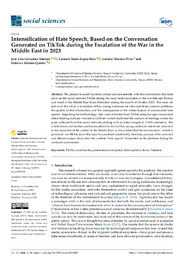Por favor, use este identificador para citar o enlazar este ítem:
https://hdl.handle.net/11000/34812Registro completo de metadatos
| Campo DC | Valor | Lengua/Idioma |
|---|---|---|
| dc.contributor.author | López Rico, Carmen María | - |
| dc.contributor.author | González-Esteban, José Luis | - |
| dc.contributor.author | Morales Pino, Loraine | - |
| dc.contributor.author | Sabater Quinto, Federico | - |
| dc.contributor.other | Departamentos de la UMH::Ciencias Sociales y Humanas | es_ES |
| dc.date.accessioned | 2025-01-17T09:17:46Z | - |
| dc.date.available | 2025-01-17T09:17:46Z | - |
| dc.date.created | 2023 | - |
| dc.identifier.citation | Social Sciences 13:49. | es_ES |
| dc.identifier.issn | 2076-0760 | - |
| dc.identifier.uri | https://hdl.handle.net/11000/34812 | - |
| dc.description.abstract | The present research has been carried out concurrently with the conversation that took place on the social network TikTok during the most recent escalation of the war between Hamas and Israel in the Middle East (Gaza-Palestine) during the month of October 2023. The main objective of this article is to analyze of how young audiences are informed about complex problems, the quality of that information, and the consequences of the intensification of uncontrolled hate speech. Regarding the methodology, data were extracted from TikTok using the open-source tool tiktok-hashtag-analysis—hosted on GitHub—which facilitated the analysis of hashtags within the posts collected from this social network, starting with an initial sample of 17,654 comments. The article draws and reaches conclusions related to the fact that young audiences indeed are interested in the escalation of the conflict in the Middle East, as it is evident that the conversation—which is polarized—on TikTok about this issue has escalated considerably. Similarly, analysis of the extracted and filtered sample shows that the variable “hate speech” intensified on the platform during the analyzed conversation. | es_ES |
| dc.format | application/pdf | es_ES |
| dc.format.extent | 16 | es_ES |
| dc.language.iso | eng | es_ES |
| dc.publisher | MDPI | es_ES |
| dc.rights | info:eu-repo/semantics/openAccess | es_ES |
| dc.rights | Attribution-NonCommercial-NoDerivatives 4.0 Internacional | * |
| dc.rights.uri | http://creativecommons.org/licenses/by-nc-nd/4.0/ | * |
| dc.subject | TikTok | es_ES |
| dc.subject | social media | es_ES |
| dc.subject | polarization | es_ES |
| dc.subject | hate speech | es_ES |
| dc.subject | Islamophobia | es_ES |
| dc.subject | Israel | es_ES |
| dc.subject | Palestine | es_ES |
| dc.subject.other | CDU::3 - Ciencias sociales | es_ES |
| dc.title | Intensification of Hate Speech, Based on the Conversation Generated on TikTok during the Escalation of theWar in the Middle East in 2023 | es_ES |
| dc.type | info:eu-repo/semantics/article | es_ES |
| dc.relation.publisherversion | https://doi.org/10.3390/ socsci13010049 | es_ES |

Ver/Abrir:
socsci-13-00049.pdf
5,82 MB
Adobe PDF
Compartir:
 La licencia se describe como: Atribución-NonComercial-NoDerivada 4.0 Internacional.
La licencia se describe como: Atribución-NonComercial-NoDerivada 4.0 Internacional.
.png)